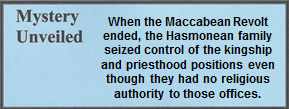03.05.02 164 B.C. December; Temple Consecrated; Sanhedrin Resumes
On the 25th day of Kislev, 164 B.C. the temple was consecrated and God honored for His divine intervention.[1] Israel was never more vividly conscious of the living God in their presence at any other time in the Inter-Testamental Period. Although they had not heard from a prophet in more than two centuries, His presence was unmistakable as another miracle took place.[2]
The dedication of the temple was a time of great joy and celebration. But it was more than a dedication celebration – it was the Feast of tabernacles that had been delayed for three months due to the political situation.[3] That is why it was an eight day event – the Feast was always an eight day celebration of “God with us” or “God living among His people.” In the process of preparing for the sacred service, the priests discovered they only had enough olive oil for the temple lamps to burn for two days. As the eight-day festival continued, they realized that God multiplied the oil to last until additional oil could be pressed and the temple dedicated. This miraculous event became known as the Feast of Dedication and was celebrated by Jesus in John 10:22.
With the dedication, the Sanhedrin functioned with greater freedom and served in both legislative and judicial roles. Therefore, kings did not have complete authority unless they also controlled the high priest who functioned as the Sanhedrin president. In Hebrew, the organization is known as Hever Hayelhudin, and the word Sanhedrin, is in reality, the Greek translation.[4] As was previously stated, the revolt came to an end; the Hasmonean family that started the uprising established itself in both the priesthood and kingship position. These positions were essentially captured without regard to the fact that the family was not of King David’s royal decendency, nor was it from the Zadokite family.[5]

[1]. http://www.myjewishlearning.com/holidays/Jewish_Holidays/Hanukkah/History.shtml. Retrieved September 20, 2014.
[2]. Gilbrant, “John.” 295.
[3]. Fruchtenbaum, The Jewish Foundation of the Life of Messiah: Instructor’s Manual. Class 17, page 9.
[4]. Golub, In the Days. 160.
[5]. New International Version Archaeological Study Bible. (notes) 1704.